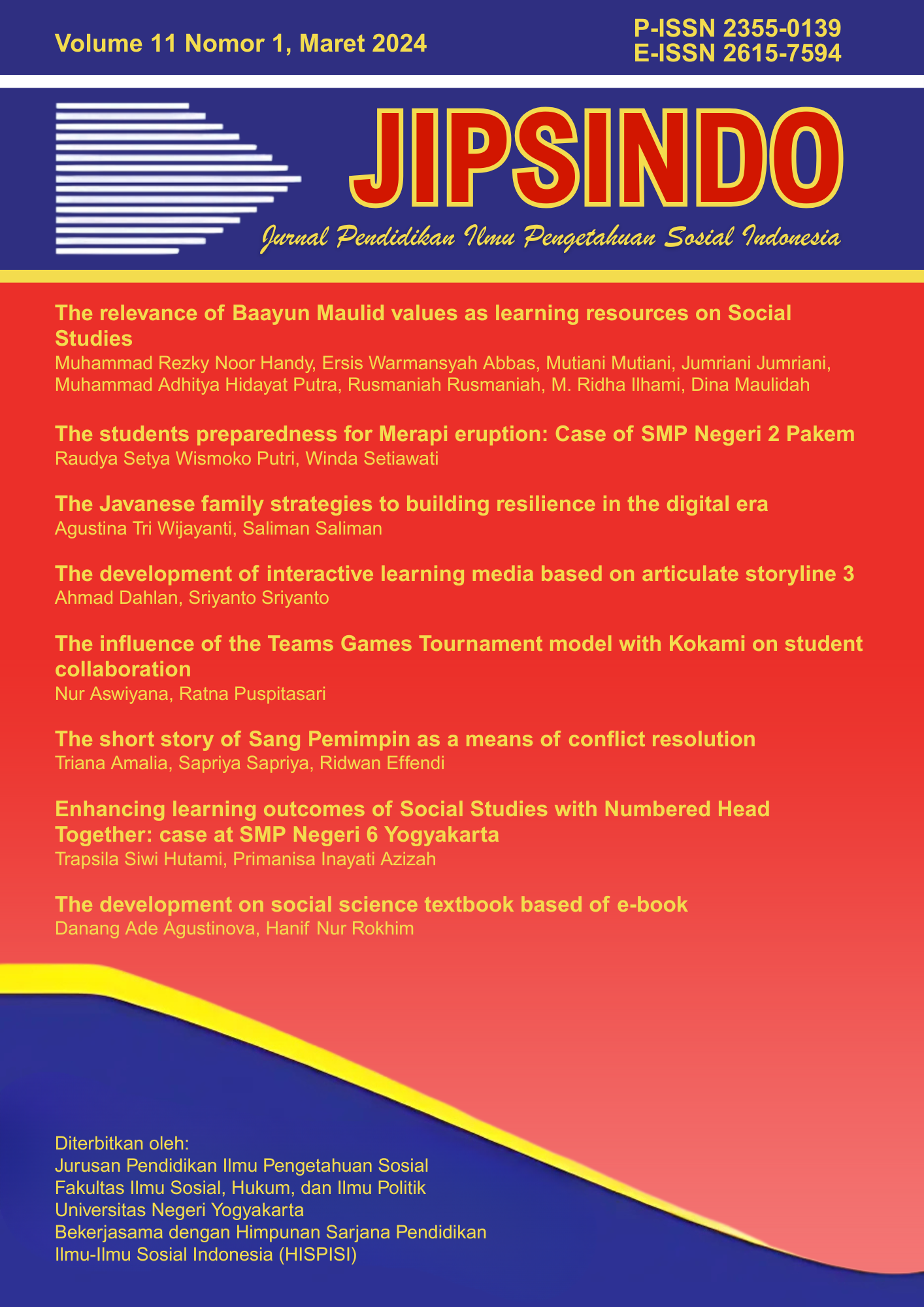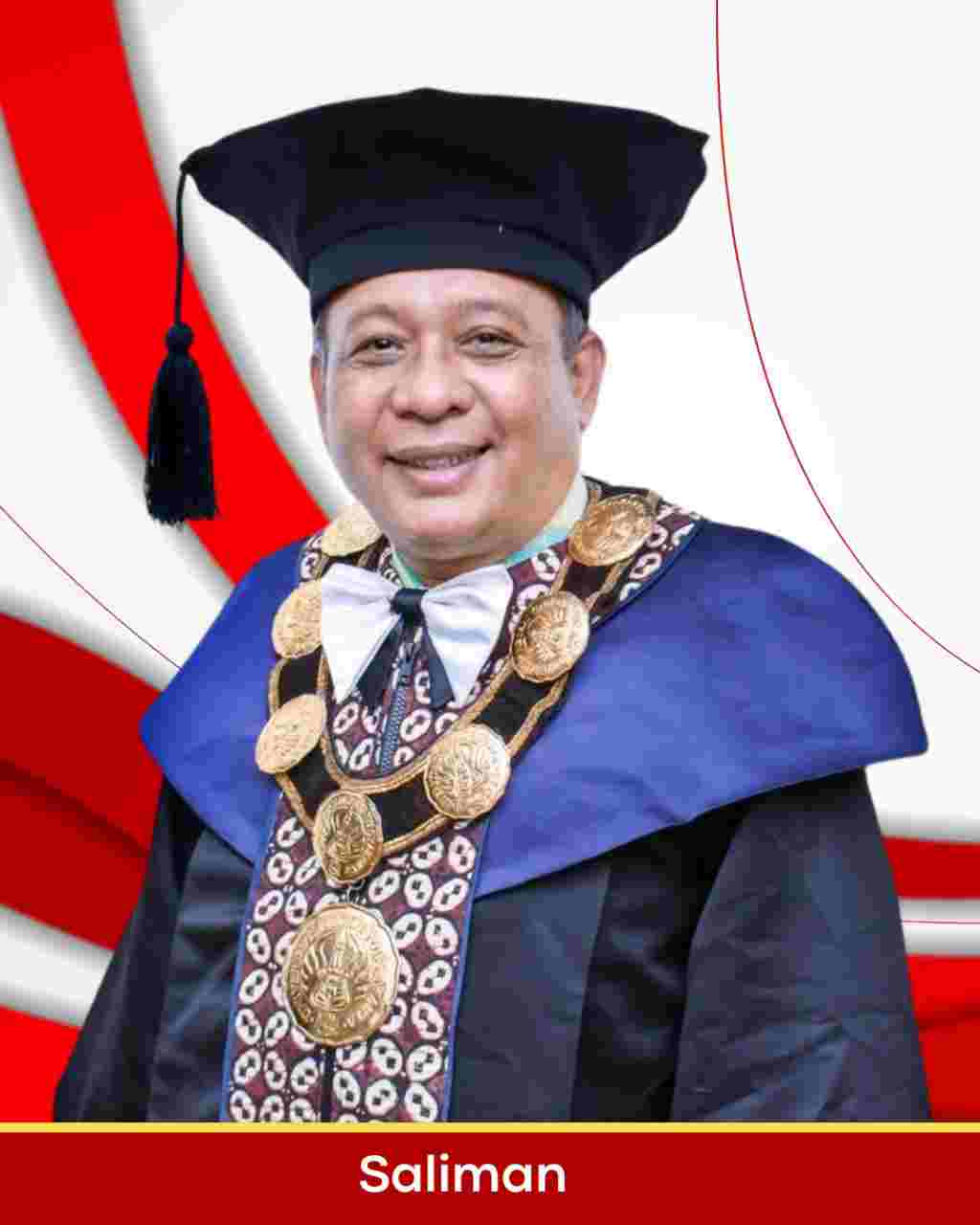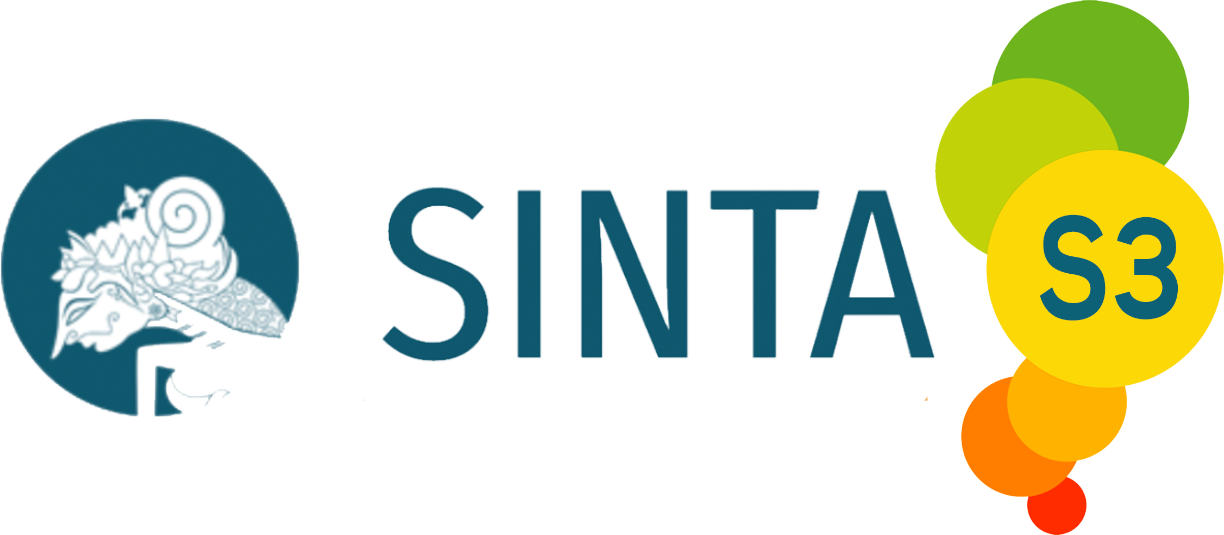Penanaman nilai demokrasi melalui pembelajaran IPS
DOI:
https://doi.org/10.21831/jipsindo.v9i2.52427Keywords:
values, democratic values, social studies subjects, social studies learningAbstract
Penelitian ini bertujuan untuk memberikan alternatif pilihan kepada para Guru IPS menengai cara penanaman nilai-nilai demokrasi melalui pembelajaran IPS. Metode penelitian yang digunakan dalam penelitian ini adalah metode kepustakaan atau library research dimana pengumpulan data dilakukan dengan penggalian beragam informasi kepustakaan. Hasil penelitian ini didapat, jika penanaman nilai-nilai demokrasi melalui pembelajaran IPS dapat dilakukan, meskipun bukan proses yang mudah. Hal ini disebabkan karena tema dan materi dalam mata pelajaran IPS masih terlalu banyak. Hal ini dapat mempengaruhi minat dan motivasi pembelajaran peserta didik. Guru IPS sebagai fasilitator pembelajaran harus dengan cermat melihat materi yang akan digunakan sebagai media penanaman nilai-nilai demokrasi karena tidak semua materi dapat digunakan. Metode yang dipergunakan dalam penanaman nilai demokrasi yang paling sesuai adalah diskusi disebabkan oleh karkteristik metode ini yang memungkinkan peserta didik dapat menerapkan berbagai ketrampilan sosial yang sesuai.
The inculcation of democratic values through social studies learning
This study aims to provide a choice for social studies teachers regarding how to inculcate democratic values through social studies learning. The research method used in this study is the library research method where data collection is carried out by extracting various library information. The results of this study are obtained if the inculcation of democratic values through social studies learning can be carried out, although it is not an easy process. This is because there are too many themes and materials in social studies subjects. This can affect the interest and motivation of students' learning. Social studies teachers as learning facilitators must carefully look at the material that will be used as a medium for inculcating democratic values because not all materials can be used. The most appropriate method used in inculcating democratic values is discussion due to the characteristics of this method which allows students to apply various appropriate social skills.
References
Adisel, & Suryati. (2021). Pengembangan nilai-nilai demokratis mahasiswa melalui Pendidikan Kewarganegaraan. IJOCE: Indonesian Journal of Civic Education, 1(2), 69–75.
Al lamri, I. H., & Tuti Istianti Ichas. (2006). Pengembangan nilai dalam pembelajaran pengetahuan sosial dasar. Departemen Pendidikan Nasional.
BSNP. (2007). Standar Proses. Permendiknas No 41 Tahun 2007.
Denney, A. S., & Tewksbury, R. (2013). How to write a literature review. Journal of Criminal Justice Education, 24(2), 218–234.
Endayani, H. (2018). Sejarah dan Konsep pendidikan IPS. Ittihad, 11(2), 117–127. http://ejournal-ittihad.alittihadiyahsumut.or.id/index.php/ittihad/article/viewFile/43/36
Fatah, R. E. S. (2004). Mencintai Indonesia dengan amal: refleksi atas fase awal demokratisasi. Penerbit Republika.
Galuh Mahardika, M. D., & Nur Ramadhan, F. (2021). Pembelajaran IPS sebagai penguat nasionalisme dalam menghadapi tantangan di era globalisasi. Jurnal Teori Dan Praksis Pembelajaran IPS, 6(2), 78–91.
Hatta, M. (1966). Demokrasi kita. Pustaka Antara.
Jane Theresia Silaban, Yuwanto, & Lusia Astrika. (2013). Persepsi mahasiswa Fisip Undip terhadap demokratisasi di Indonesia. Journal of Politic and Government Studies, 2(3).
Mansur, A. (2006). Implementasi Klarifikasi Nilai Dalam Pembelajaran dan Fungsionalisasi Etika Islam. Al-Fikra: Jurnal Ilmiah Keislaman, 5(1), 44–69.
Nasional, I. D. P. (2008). Kamus Besar Bahasa Indonesia: Pusat Bahasa.
Nasution, T., & Arafat Lubis, M. (2018). Konsep Dasar Ilmu Pengetahuan Sosia. Samudra Biru.
Notonagoro. (2013). Demokrasi Pancasila. Kencana.
Nurul Zuriah. (2014). Nilai-nilai karakter bangsa. Kencana.
Samlawi, F., & Maftuh, B. (1998). Konsep dasar IPS. Depdikbud.
Sapriya. (2009). Pendidikan IPS. Rosda Karya.
Sardiman. (2014). Interaksi dan Motivasi Belajar Mengajar. Rahagrafindo persada.
Setiyadi, A. C. (2008). Konsep demokrasi pendidikan Menurut John Dewey. At-Ta'dib, 5, 77–102.
Suhada, I. (2017). Konsep dasar IPS. Remaja Rosdakarya.
Susanti, E., & Endayani, H. (2018). Buku konsep dasar IPS . CV. Widya Puspita.
Syaodih, N. (2009). Metode penelitian pendidikan. PT. Remaja Rosdakarya.
Udin S. Winataputra. (2007). Teori belajar dan pembelajaran. Universitas Terbuka.
Downloads
Published
How to Cite
Issue
Section
Citation Check
License
Authors who publish with this journal agree to the following terms:
- Authors retain copyright and grant the journal right of first publication with the work simultaneously licensed under a Creative Commons Attribution License that allows others to share the work with an acknowledgement of the work's authorship and initial publication in this journal.
- Authors are able to enter into separate, additional contractual arrangements for the non-exclusive distribution of the journal's published version of the work (e.g., post it to an institutional repository or publish it in a book), with an acknowledgement of its initial publication in this journal.
- Authors are permitted and encouraged to post their work online (e.g., in institutional repositories or on their website) prior to and during the submission process, as it can lead to productive exchanges, as well as earlier and greater citation of published work (See The Effect of Open Access).

JIPSINDO (Jurnal Pendidikan Ilmu Pengetahuan Sosial Indonesia) is licensed under a Creative Commons Attribution-ShareAlike 4.0 International License.
Based on a work at https://journal.uny.ac.id/index.php/jipsindo.
















